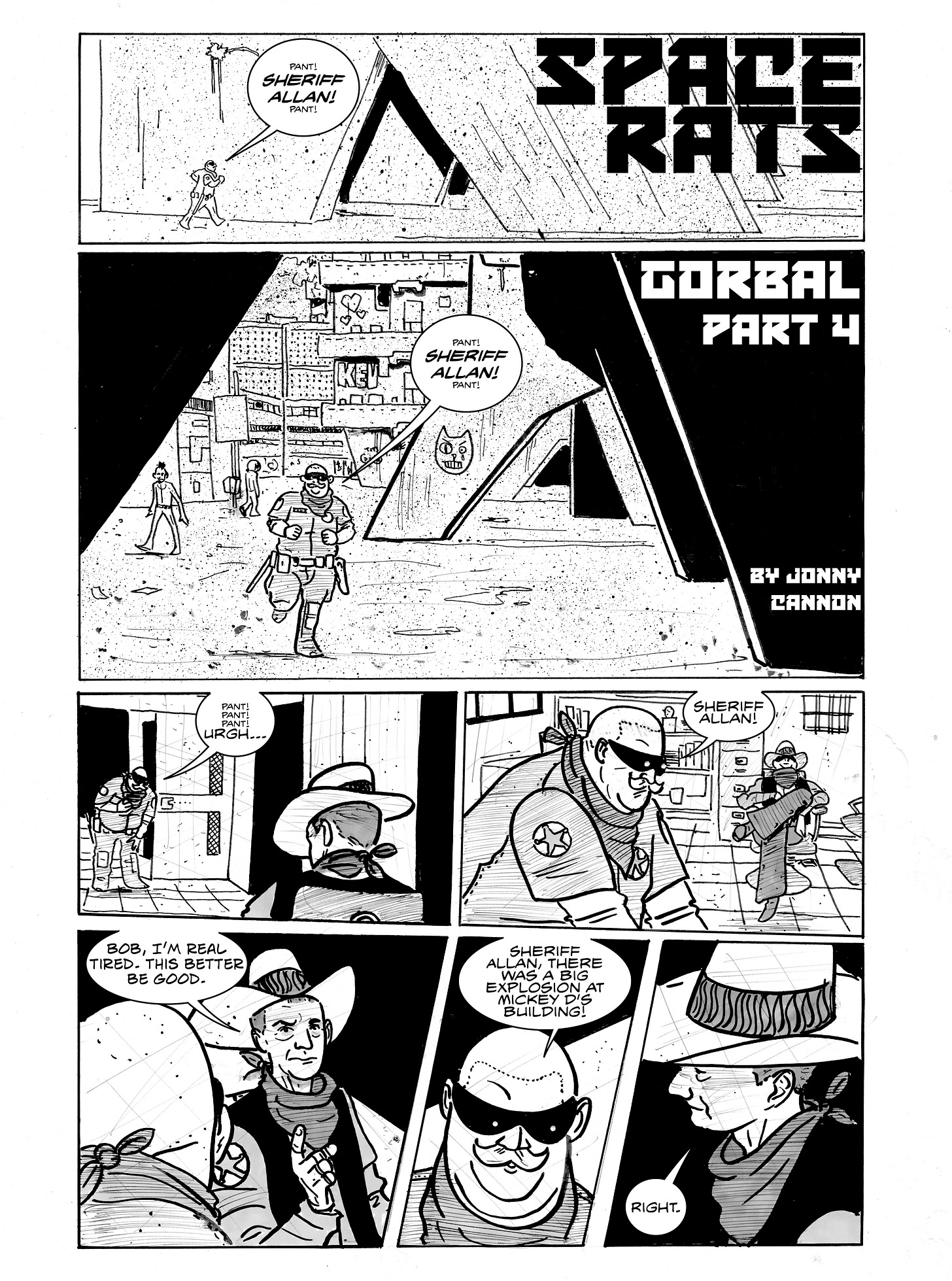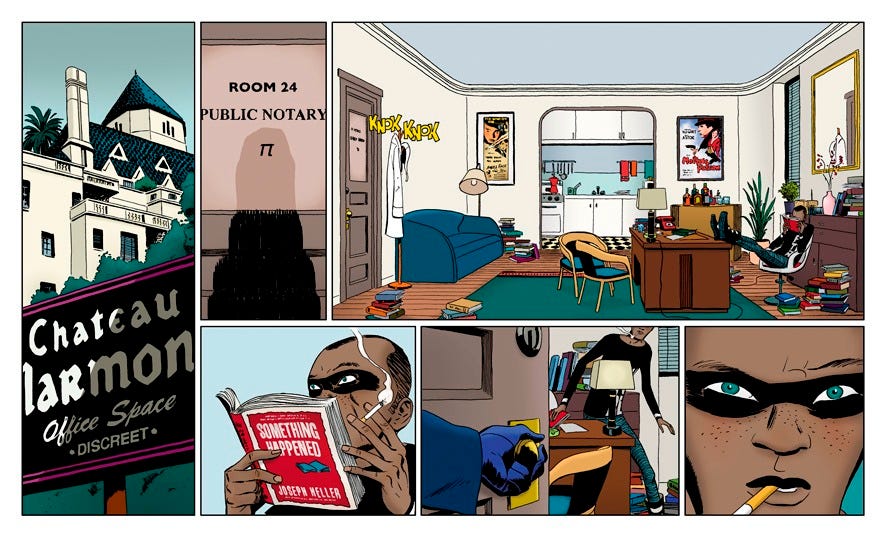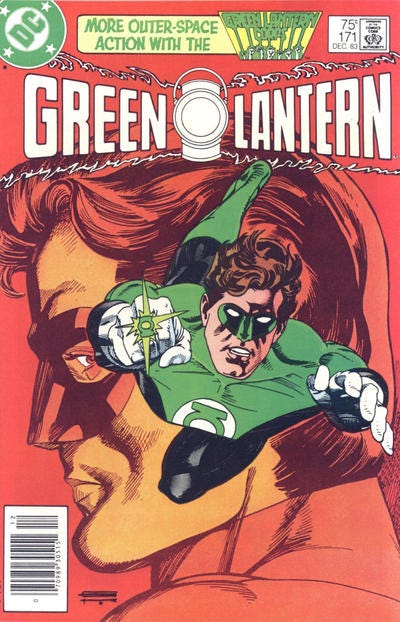I was 40 when I self-published my first comic, which was a truly horrible A4 version of The United. I designed the cover to have a British tabloid red-top feel and it was just really, really shite. I rushed it and it came out really poorly. I hated it so much that I threw away a box of 40 odd comics. Bear in mind that the print-run was only 50 copies. I don't even have one myself, so if you have one then please be assured that it's super-rare. Also be assured that it’s still only worth about 50p.
I'm soon to turn 51 and I’m working away on my new comic, The United: Five Triangles, which will be out when I’m 52. It takes me about two years to produce a longform comic or ‘graphic novel’, some folk (not me) call it. As things stand, my current comics bibliography is as follows:
The United 1 - 5
Transylvanian Knights 1
Portal Comics Anthology 1
The United: Welcome to the Shitshow
Hidden Lives (Chrissy)
Vigilantia
The United: Going Underground
The United: Five Triangles (in progress)
There are also some lost and unpublished comics. I pencilled around a third of Transylvanian Knights 21 and there’s an unlettered comic featuring Curt Beaver from my early 20s. I drew a Big Cat strip when I was in my early 20s, but I’ve no idea what happened to that. I do remember drawing that in a style evoking Batman: The Animated Series. I also did something with someone pretty recently, a collaborative project, but I blew the deadline. That one stings, as the script was fantastic (and challenging to draw).
I’m mentioning this for two reasons. First, it occurs to me that as the reach of my newsletter has grown, quite a few readers possibly might not realise that I self-publish comics. This is likely because I am disinclined towards self-promotion and there are approximately eight million smallpress comic creators in Scotland, even though the national population was recorded at only 5,413,100 in the 2020 Census. This either means there are over two and a half million comic creators living in the shadows or I am massively exaggerating. Second, comics sales have really flattened out across the board (except bookshops and Amazon), so it’s time for some shameless self-promotion disguised as thoughtful reflection.
YOU CAN FIND MY CRITICALLY ACCLAIMED COMICS HERE.
The United
The United is a mystery thriller about a team of superheroes run by the UK Government. It’s set against the backdrop of sinister politicians, outlandish supervillains, druidic magic-science and preposterous conspiracy theories. The comics combine my love of comics with other forms of pop culture.
Comics-wise, it very much is a nod to the Marvel UK comics of the 1980s that I grew up reading, particularly Captain Britain (beautifully drawn by Alan Davis). V for Vendetta, Marvelman, Zenith and Animal Man were all big influences too, initially. My approach and style is directly influenced by Alan Davis, Alex Toth, Steve Ditko, Wallace Wood, Harvey Kurtzman, David Lloyd, Howard Chaykin, Johnny Craig, Mick McMahon, Jim Woodring, Julio Schiaffino, Bernie Krigstein, Frank Miller, Steve Rude, Russ Manning, Geoff Darrow, Moebius, Hergé, Frank Bellamy and on and on. I see elements of their approach, technique and style in the way I draw, design pages, choreograph scenes, compose panels or tell stories. The big four for me are Toth, Ditko, Wood and Kurtzman.
There are also tangible influences ranging from David Lynch’s oeuvre in film and TV, the Avengers TV show of the 60s, David Bowie's music, True Detective and the surrealist works of Rene Magritte, Max Ersnt and Lee Miller.

The United: Welcome to the Shitshow
Welcome to the Shitshow is about the doomed 44 days of a team of superheroes funded by the UK Government. A huge conspiracy gradually unfolds as the heroes begin to realise their true place in the world.
I first published The United back in 2014 after my wife suggested that I actually do something with the pages that I’d been drawing off and on for a few years. I published 50 copies of the afore-mentioned, horrible A4 collection of The United which I took along to Glasgow Comic Con and sheepishly showed to Savage Dragon creator Erik Larsen, at the behest of my pal Ross. Sadly, Erik Larsen didn’t suggest that Image Comics publish The United2 and instead I went on to self-publish 5 issues in A5 format. Issues 3 and 4 contained a full-colour back-up strip called Space Rats, which was coloured by Gavin Boyle (creator of Escape from Coatbridge and Rapid Gazzer). Gavin and I then produced Portal Comics Anthology 1, which continued the adventures of The United and Space Rats, as well as Escape from Coatbridge. My reasoning was that I liked to do the whole ‘hatch, match and dispatch’ thing with The United. It was also meant to encourage Gav to finish Escape from Coatbridge.
Gav then stopped making comics, the Covid 19 pandemic hit and I decided to finish the story of The United and collect it all in a 220 page hardback book. 79 pages of comics in that book were new, slightly more than the 10 pages I originally intended.
The title of the comic was originally The Premier, which I had completely forgotten until I found a retroactively written pitch recently. The United came about when I was trying to fit an overarching story over the multiple pages that I had drawn over the course of a few years, just for the sake of drawing. I think I was going to tweak the main characters’ costumes so that they were more like football strips, with sponsorship etc. That then led to The United, which made me think about David Peace’s book, The Damned United, about Brian Clough’s 44 day stint in charge of Leeds United. It’s funny where the mind goes. Irrespectively, The Premier was a truly shit name for a comic.
The United: Going Underground
Going Underground is about two detectives trying to solve a murder and entering a surrealist nightmare of hipster gangsters, political conspiracy, druidic magic-science and conflicted superheroes. After Welcome to the Shitshow, I was pretty much done with making superhero comics - that is, until Tony Esmond asked me during a podcast if I had any more stories about the characters from the book. That really got me thinking.
Going Underground was always going to be more noirish in tone, but the original premise was pretty much Big Cat and the Mighty Scotsman as the lead characters, with a Butch Cassidy and the Sundance Kid vibe. Early on, Jimmy Pilgrim and Evie Smith evolved into the main characters, simply because that’s the way the story was meant to happen.
I was much more structured in my approach to ‘writing’ this comic, utilising Howard Chaykin’s cue-card methodology that I had learned of doing his Paradigm course, but I still let the story tell itself to a large extent, but the characters certainly don’t write themselves. This is not dissimilar to the way that Jim Woodring writes his Frank comics, as described in a New York Times article,‘The Unifactor allows him to draw and write about it only in a certain way; if he tries to go against its instructions, the Unifactor may interfere or abandon him. The process is painful, but its results are unique…’
Recommendations!
The Private Eye
I think Brian K. Vaughan is one of the best writers in comics and I’m a total sucker for Marcos Martin’s comic art. Muntsa Vicente’s colours are wonderfully effective too. This was originally published as a pay-what-you-want webcomic, but I own the hardback collection (The Cloudburst Edition, which has additional text features in the back). It's a stunning comic, just a truly marvellous piece of work. I’m predisposed to like this as I love noir and this fits into the L.A noir sub-genre, albeit with a sci-fi bent.

This is one of my favourite comics and I reread it at least once a year. I cannot recommend this highly enough.
A Hidden Gem
Green Lantern 171 (1983) is an oddity, even though at first glance it looks like a cookie-cutter comic. The reason why I think the comic is pretty cool is that the feature is drawn by Alex Toth and inked by Terry Austin and the back-up is drawn and lettered by Dave Gibbons. Gil Kane draws the cover. Frankly, that’s an obscenely talented line-up on a bog standard issue of a pretty generic B or C list superhero title.
There's a weird little history as to how the comic was written, which is suggested by the odd credits. According to the Grand Comics Database, ‘Noel Naive is used for the Cavalieri rewrite of a Snyder script, as Robin Snyder and co-plotter Keith Giffen had their names removed because of the extensive revision to the original script. Giffen stated […] that Cavalieri requested the Noel Naive pseudonym as a show of solidarity’.
Austin uses a chunkier marker line than usual, possibly a nod to Toth’s ‘dumb line’3 or maybe Toth was drawing actual size. The storytelling is superb and there is some neat page design in there. The back-up strip drawn by Gibbons is beautiful and the story has a delightful air. My only caveat is that I don’t like the Kane cover, but that’s probably just me. This comic should only set you back a couple of quid.
Next Time!
I quite fancy recording another episode of In Full Disclosure, my infrequent podcast. Thank you to folk who left positive feedback on that initial episode - it’s much appreciated. I also need to write something about Jim Woodring.
I’ve been asked a few times why I stopped working on Transylvanian Knights and the honest answer is that The United was a more popular seller for me. As I’ve gotten older I would also rather work on longform projects that I wholly created. I would like to still collaborate on shorter comics features, but only a few pages here and there.
He did however give me some great feedback, saying that I knew how to tell a story and gave me some inking tips. I have subsequently thanked him again online, as this advice was of huge help.
A term used by David Mazzucchelli.





Enjoyed reading about your comic creating history. This is a great stack and another In Full Disclosure episode would be fantastic.
There's a Superman Annual that has the same Kane/Toth/Austin art team, along with a fun little Curt Swan backup.
I don't understand the current antipathy towards "graphic novel"; it does what it says on the tin and fits the form better than simple "comic", which almost always refers to the traditional floppy. The one term I completely despise, though, is "comicbook" -- that's for the devil.